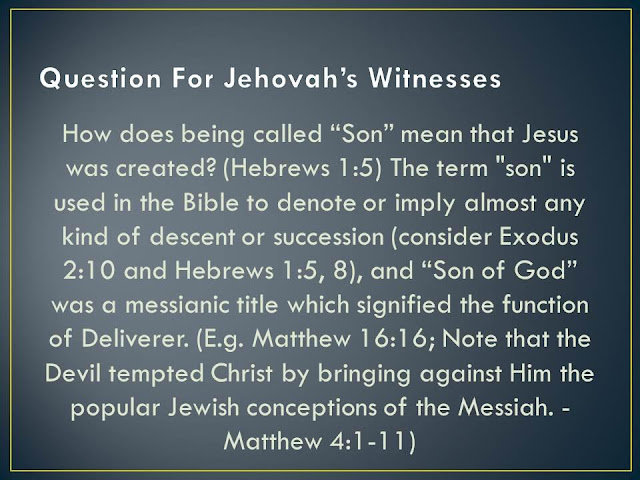I was raised in the Watchtower cult. I considered
baptism when I was eleven and changed my mind, then in my preteens and early
teens I was unconvinced of their religion and thought Jehovah's Witnesses were
fanatics that did not really respect the Bible, but I went along with things
out of respect for my parents. I was eventually convinced and was baptized in
that religion in 1979 when I was 16 and later disassociated myself in 1985.
Over time I realized that, although there are good people among the Jehovah’s
Witnesses, we were no better than the people we condemned; we were just trained
to look at the Watchtower Organization through rose-coloured glasses. I was
burnt out on religion and avoided church for a long time, but I still wondered
if there was a true Christian religion. Eventually I learned that salvation is
a personal relationship with Jesus Christ, and I was born again in January of
1987. I am concerned about helping Christians lead Jehovah’s Witnesses to
salvation.
Jehovah's Witnesses do not do door-to-door visitation
work because of any hatred for God, the JW at your door is hoping to please God
through hours of fruitless service. The JW at your doorstep is someone who has
lost his way in his search for God and needs to be directed to "the
way." (John 14:6)
Jehovah’s Witnesses often do not know where to turn
because the Watchtower organization has convinced them that the whole world is
evil and that every religious group other than their own is satanic. Jehovah’s
Witnesses who no longer accept or believe Watchtower teachings and policies, or
are no longer convinced, often stay active (even zealous) in attendance and
proselytizing because disagreeing with or leaving the Watchtower organization
will mean being shunned by JW family and friends (He probably doesn't believe
there is anywhere else to go, and it may also appear to him that friendship and
fellowship will be scarce outside the Organization).
Watchtower teachings in many areas (morality, family
responsibilities, etc.) are correct and have a positive effect. (Consider
Proverbs 13:13) This, along with continual study (using Watchtower
publications), fellowship, and involvement, keeps most Jehovah’s Witnesses
convinced that the Watchtower organization is the truth. But Watchtower
theology is much like a house of cards; when a Jehovah’s Witness realizes that
the Watchtower organization is wrong on a point (even a minor point) he begins
to see other errors.
Knowing what Jehovah’s Witnesses believe is one thing
but knowing how to relate to them personally and how to deal with Jehovah’s
Witnesses that you meet in public places, social situations, work, school, and
at your doorstep is quite another thing. Here are some suggestions:
• When a Jehovah’s Witness comes to your door let him
go through his presentation without interruption on your part. When he finishes
disregard what he said and share your testimony. Tell him what the Lord Jesus
Christ means to you and share your salvation experience. Then ask him to share
his testimony and insist that he tell you about his personal experience with
Jesus Christ. This will throw him off his track. If he should try to give some
sort of testimony this is a good sign that you may be able to eventually reach
him with the truth. If he should get angry or upset and leave, the Lord can use
your testimony to work on his heart.
• When dealing with Jehovah’s Witnesses you meet in
public places, social situations, work, school, etc., remember that a personal
testimony is a powerful evangelistic tool, and you should look for opportunity
to share your testimony ASAP.
• Be extremely patient with Jehovah’s Witnesses.
(Consider Matthew 21:28-31 & John 16:12) Disappointment is inevitable if
you expect to convert someone overnight. Don’t be surprised if it is necessary
to go over the same point numerous times, and don’t be surprised if it takes a
long time for a Jehovah’s Witness to recognize that his faith is misplaced or
see that at least a few Watchtower teachings are wrong.
• Never use witnessing as opportunity to show off your
intellect or Bible knowledge, and keep in mind that there is no canned approach
that applies to every circumstance and each individual Jehovah’s Witness.
• Regular personal Bible study to develop your
knowledge and understanding of Bible doctrines (along with some familiarity
with Watchtower teachings) is important if you wish to be effective in leading
them out of darkness and into the truth and avoid being deceived yourself, and
it is important to spend time in prayer before each encounter with a Jehovah’s
Witness. (I recommend “The New Topical Textbook.")
• When responding to Jehovah’s Witnesses that come to
their door many Christians like to use what could be called the Invasion or
Blitzkrieg method of evangelism: They want to attack and destroy every heresy
in the Jehovah’s Witnesses belief system quick, fast, and in a hurry. While a
Christian may feel that he scored a victory by winning an argument this rarely
yields good results as far as leading anyone to Christ. It would be better to
focus on one or two issues each time you meet with a Jehovah’s Witness and not
force him to digest more than he can take in one sitting. If you would do this,
and if you are friendly and respectful to him, he is more likely to ponder the
information you give him instead of shrugging it off (as you might do if
someone attacked every point of your belief system all at once), and he is more
likely to make an appointment to return and discuss other issues with you and
possibly keep returning (which is what you should want him to do). I also like
to illustrate the point this way: I like chicken, and I find it difficult to
turn down a chicken dinner, but I do not want anyone to throw pieces of chicken
at me or beat me over the head with a frozen drumstick.
• It is important to be kind and respectful to
Jehovah’s Witnesses and find a common ground, such as their commitment to God
(even though they have an obviously heretical view of God) and respect for
Bible standards (even though they have a twisted view of Scripture and believe
in salvation by works). Note Paul's approach to the Athenians in Acts 17:22-23.
Was he hostile or argumentative with the Athenians, and did he expect them to
meet him where he was at in knowledge and spirituality? No, he found a common
ground and approached them from there.
• Remember that the objective is to win minds and
hearts, not win arguments or be right, and the goal is the eventual salvation
of lost souls. A Christian who is argumentative or hostile with Jehovah’s
Witnesses will only convince them that they are right; it is usually better to
light a candle than to curse the darkness.
• Make sure you respect the Bible as the authority for
your claims or statements. (Do not say: My pastor says..., I have always
said..., etc.)
• Do not be afraid to say no. If you don't want him to
think of you as a prospect and be that much more determined to win you over
(instead of being receptive to the truth) then don't buy anything or accept
anything free. You can give a polite refusal and still converse with him.
• Do not be intimidated by their attitude that they
are more spiritual or knowledgeable than you are. Since they are the ones
trying to sell you something let them be the ones that must prove themselves to
you.
• Speak with conviction. (Acts 4:13) Why should
someone consider your message if you do not sound convinced of it yourself?
• Avoid answering leading questions (What do you think
about world conditions? Have you ever wondered...? What do you think about...
[some news item]? Do you think there is a solution to the crime problem, or a
way to feel secure? Etc...), as they use these questions to discern how best to
win you over.
• If he tries to quote a whole list of Bible passages
out of context all at once, insist that you be allowed to pause and read each
passage aloud in context (include perhaps about 4 or 5 verses preceding and
maybe 4 or 5 verses following the passage.). This forces him to consider his
proof texts in relation to immediate context, which he may have never done
before, and hopefully he might start doing this on his own.
• Do not pretend to have all the answers. (You do
not.)
• Do not put on a pretense. Remember that they are
quick to spot hypocrisy.
• Since you do not already know all about his beliefs
and his organization, do not pretend that you do.
• Since you do not like to be patronized or demeaned
you should give him the same courtesy that you want from others.
• Show concern for a Jehovah’s Witness, buy him a cup
of coffee, look for opportunity to demonstrate kindness to him, etc... Show him
that you love and care about him despite disagreeing with him. As with other
cults, most Jehovah’s Witnesses were lured through love-bombing and need to see
that there are caring people outside of the Watchtower Organization.
• Express your humanness. The Watchtower Organization
demands such a high standard of perfection that meeting someone who is secure
in his faith despite being less than perfect can make a good impression.
• Appeal to their insecurity. While they appear
assured and confident, inside they are troubled by questions and doubts and
often feel trapped. You should try to steer the conversation beyond minor
issues and debatable points and toward matters of the heart and spirit and try
to carefully undermine the authority of the Watchtower Society for them to be
more open to the true Gospel (but do not directly attack their founders or
leaders).
• It is a good idea to be prepared to use the New
World Translation in discussions with Jehovah’s Witnesses. For personal Bible
reading and Bible study I recommend the KJV and not the NWT. But Jehovah’s
Witnesses believe the NWT is the most accurate translation and, ironically, the
NWT often counters Watchtower teachings more effectively than the KJV.
• Many Christians think the key to leading Jehovah’s
Witnesses out of darkness and into the truth is to merely show them Bible
passages and win arguments, but this idea is far removed from reality. Let's
look at a typical scenario: During a discussion with a Jehovah’s Witness you
and the Jehovah’s Witness agree that the Holy Bible is the final authority and
his attitude and behaviour clearly indicate that he is sincere in his claim to
believe the Bible and respect the Bible as the final authority. So, it appears
that helping him see through Watchtower errors is just a matter of showing him
passages of Scripture. You or the Jehovah’s Witness brings up a Bible teaching
with which he disagrees, or he brings up a Watchtower teaching, and you happen
to know a Bible passage that makes the truth crystal-clear. But when you show
him a Bible passage, he gives you an extremely flawed (yet sincere) explanation
or dismisses your point entirely. Then he counters this by showing you a
passage of Scripture and giving you a flawed interpretation. Then you show him
another Bible passage and he either gives you a flawed interpretation or
dismisses your point entirely, and he shows you another Bible passage and gives
a flawed interpretation, and the discussion becomes a game of Bible ping pong.
What happened? The JW sincerely believes that the Bible is the final authority
and he sincerely believes that Watchtower teachings are Bible teachings and
that the Watchtower Society is God's channel of truth. In his indoctrination a
subtle switch was made from reliance on the word of God to reliance on the
words of men (Watchtower publications). He is severely discouraged from
studying the Bible independently of the Watchtower Organization and Watchtower
publications, and for JWs Bible study means studying Watchtower publications.
The Jehovah’s Witness is continually taught at meetings and in Watchtower
publications how to respond to most arguments (even Scriptural reasons from
Christians), he is continually taught Watchtower explanations of Scriptures and
reasons to trust Watchtower insights as superior, and he has been taught
(programmed) to look at the Watchtower organization through rose coloured
glasses. When you show a Bible passage to the Jehovah’s Witness his conditioned
and preprogrammed mind automatically replaces what the passage says with what
the Watchtower Society says it means. To help him see the correct understanding
or interpretation of a Bible passage you may need to point out the meanings of
words, the grammar used, how the context impacts the meaning, and ask logical
questions, and you will need to be patient.
• Jehovah’s Witnesses believe Watchtower heresies
because they have been taught (programmed) to trust Watchtower leadership and
Watchtower publications to think for them, to not critically analyze Watchtower
teachings, and to avoid or ignore criticisms of the Watchtower organization and
Watchtower teachings. On the other hand, they feel compelled and obliged to
answer sincere questions and help non-JWs understand and accept "the
truth," Watchtower teachings, which is why good questions are an effective
means of persuading them to think and start seeing the fallacies of Watchtower
teachings and the truths of Scripture. For example, asking a Jehovah’s Witness
to show you where the Bible says that Jesus Christ is Michael the Archangel
instead of dogmatically asserting that Jesus Christ is not an angel could make
him start wondering about this himself.
Remember to pray for Jehovah's Witnesses and pray for
the potential convert who will eventually come to your door.
Why Reach Out to Jehovah's Witnesses? (out of JW.org)
My Exodus From The Watchtower Organization
Help For Ex-Jehovah's Witnesses
QUESTIONS FOR JEHOVAH'S WITNESSES
The Holy Bible or Watchtower Publications?
Jehovah's Witnesses & "New Light"
Was the Star of Bethlehem a demon as taught in Watchtower Publications?
The Watchtower Prohibition Against Holidays & Birthdays
Romans 10:13 in the New World Translation
The Watchtower Interpretation of Exodus 3:15
The Name Jehovah Is Not In The New Testament
Jehovah's Witnesses & The Heavenly Hope
Did The “Last Days” Begin In 1914 AD as Taught in Watchtower Publications?
Watchtower Teachings About The Second Coming
Hell - Refuting The Watchtower Teaching Of Annihilationism
Jehovah's Witnesses & The Trinity
The Only True Christian Religion?
EVERY JEHOVAH'S WITNESS SHOULD BE ASKED THESE QUESTIONS
WATCHTOWER TEACHINGS ON 1975 & SIX THOUSAND YEARS OF HUMAN HISTORY ARE FLAWED
WATCHTOWER ANTITRINITARIANISM REFUTED
WITNESSING TO JEHOVAH’S WITNESSES & THEIR CHILDREN
Recommended:

















































































































































































No comments:
Post a Comment
Note: Only a member of this blog may post a comment.